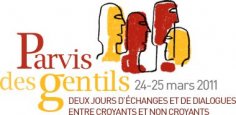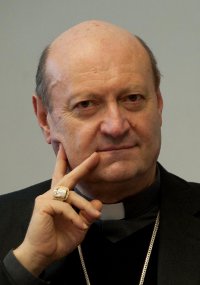 Cardinal Gianfranco Ravasi’s interview on the importance of the Court of the Gentiles for us. This is probably the single most significant initiative of the Pontifical Council for Culture taking seriously the place of belief and unbelief. The Pope some time ago asked the pastors of the Church to take atheism as a serious matter to engage in. And by atheism he’s not suggesting the Christopher Hitchens’ version of atheism but what might be called “honest atheism,” those who ask sincere questions of belief and who are seeking to live a coherent life. The Pope is brilliant in his call to respect, dialogue and living.
Cardinal Gianfranco Ravasi’s interview on the importance of the Court of the Gentiles for us. This is probably the single most significant initiative of the Pontifical Council for Culture taking seriously the place of belief and unbelief. The Pope some time ago asked the pastors of the Church to take atheism as a serious matter to engage in. And by atheism he’s not suggesting the Christopher Hitchens’ version of atheism but what might be called “honest atheism,” those who ask sincere questions of belief and who are seeking to live a coherent life. The Pope is brilliant in his call to respect, dialogue and living. I know that at the invitation of Cardinal André Vingt-Trois, the Archbishop of Paris, and of Cardinal Gianfranco Ravasi (seen right), the President of the Pontifical Council for Culture, you are gathered in great numbers in front of the Cathedral of Notre Dame in Paris. I greet all of you, together with our brothers and friends from the Taizé Community. I am grateful to the Pontifical Council for having taken up and extended my invitation to open a number of “Courts of the Gentiles” within the Church. This image refers to the vast open space near the Temple of Jerusalem where all those who did not share the faith of Israel could approach the Temple and ask questions about religion. There they could meet the scribes, speak of faith and even pray to the unknown God. The Court was then an area of separation, since Gentiles did not have the right to enter the consecrated area, yet Jesus Christ came to “break down the dividing wall” between Jews and Gentiles, and to “reconcile both to God in one body through the cross, thus putting to death that hostility in himself”. In the words of Saint Paul, “He came and proclaimed peace…” (cf. Eph 2:14-17).
I know that at the invitation of Cardinal André Vingt-Trois, the Archbishop of Paris, and of Cardinal Gianfranco Ravasi (seen right), the President of the Pontifical Council for Culture, you are gathered in great numbers in front of the Cathedral of Notre Dame in Paris. I greet all of you, together with our brothers and friends from the Taizé Community. I am grateful to the Pontifical Council for having taken up and extended my invitation to open a number of “Courts of the Gentiles” within the Church. This image refers to the vast open space near the Temple of Jerusalem where all those who did not share the faith of Israel could approach the Temple and ask questions about religion. There they could meet the scribes, speak of faith and even pray to the unknown God. The Court was then an area of separation, since Gentiles did not have the right to enter the consecrated area, yet Jesus Christ came to “break down the dividing wall” between Jews and Gentiles, and to “reconcile both to God in one body through the cross, thus putting to death that hostility in himself”. In the words of Saint Paul, “He came and proclaimed peace…” (cf. Eph 2:14-17).
At the heart of the “City of Light”, in front of the magnificent masterwork of French religious culture which is Notre Dame, a great court has been created in order to give fresh impetus to respectful and friendly encounter between people of differing convictions. You young people, believers and non-believers alike, have chosen to come together this evening, as you do in your daily lives, in order to meet one another and to discuss the great questions of human existence. Nowadays many people acknowledge that they are not part of any religion, yet they long for a new world, a world that is freer, more just and united, more peaceful and happy. In speaking to you tonight, I think of all the things you have to say to each other. Those of you who are non-believers challenge believers in a particular way to live in a way consistent with the faith they profess and by your rejection of any distortion of religion which would make it unworthy of man. Those of you who are believers long to tell your friends that the treasure dwelling within you is meant to be shared, it raises questions, it calls for reflection. The question of God is not a menace to society, it does not threaten a truly human life! The question of God must not be absent from the other great questions of our time.
Dear friends, you are challenged to build bridges between one another. Take advantage of this opportunity to discover, deep within your hearts and with serious arguments, the ways which lead to profound dialogue. You have so much to say to one another! Do not turn away from the challenges and issues before you!
I believe deeply that the encounter of faith and reason enables us to find ourselves. But all too often reason falters in the face of self-interest and the lure of profit, and is forced to regard the latter as the ultimate criterion. Striving for truth is not easy. But each of us is called to make a courageous decision to seek the truth, precisely because there can be no shortcut to the happiness and beauty of a life of genuine fulfilment. Jesus says as much in the Gospel: “The truth will make you free”.
Dear young people, it is up to you, in your own countries and in Europe as a whole, to help believers and non-believers to rediscover the path of dialogue. Religions have nothing to hear from a just secularity, one that is open and allows individuals to live in accordance with what they believe in their own consciences. If we are to build a world of liberty, equality and fraternity, then believers and non-believers must feel free to be just that, equal in their right to live as individuals and in community in accord with their convictions; and fraternal in their relations with one another. One of the reasons for this Court of the Gentiles is to encourage such feelings of fraternity, over and above our individual convictions yet not denying our differences. And on an even deeper level, to recognize that God alone, in Christ, grants us inner freedom and the possibility of truly encountering one another as brothers and sisters.
Our first step, the first thing we can do together, is to respect, help and love each and every human being, because he or she is a creature of God and in some way the road that leads to God. As you carry on the experience of this evening, work to break down the barriers of fear of others, of strangers, of those who are different; this fear is often born of mutual ignorance, scepticism or indifference. Work to create bonds with other young people, without distinction and keeping in mind those who are poor or lonely, unemployed, ill or on the margins of society.
Dear young people, what you can share is not only your experience of life, but also your approach to prayer. Believers and non-believers, as you stand in this court of the Unknown, you are also invited to approach the sacred space, to pass through the magnificent portal of Notre Dame and to enter the cathedral for a moment of prayer. For some of you this will be a prayer to a God you already know by faith, but for others it may be a prayer to the Unknown God. Dear young friends who are non-believers, as you join those who pray in Notre Dame on this day of the Annunciation of the Lord, open your hearts to the sacred texts, let yourselves be challenged by the beauty of the music and, if you truly desire it, let your deepest feelings rise towards the Unknown God.